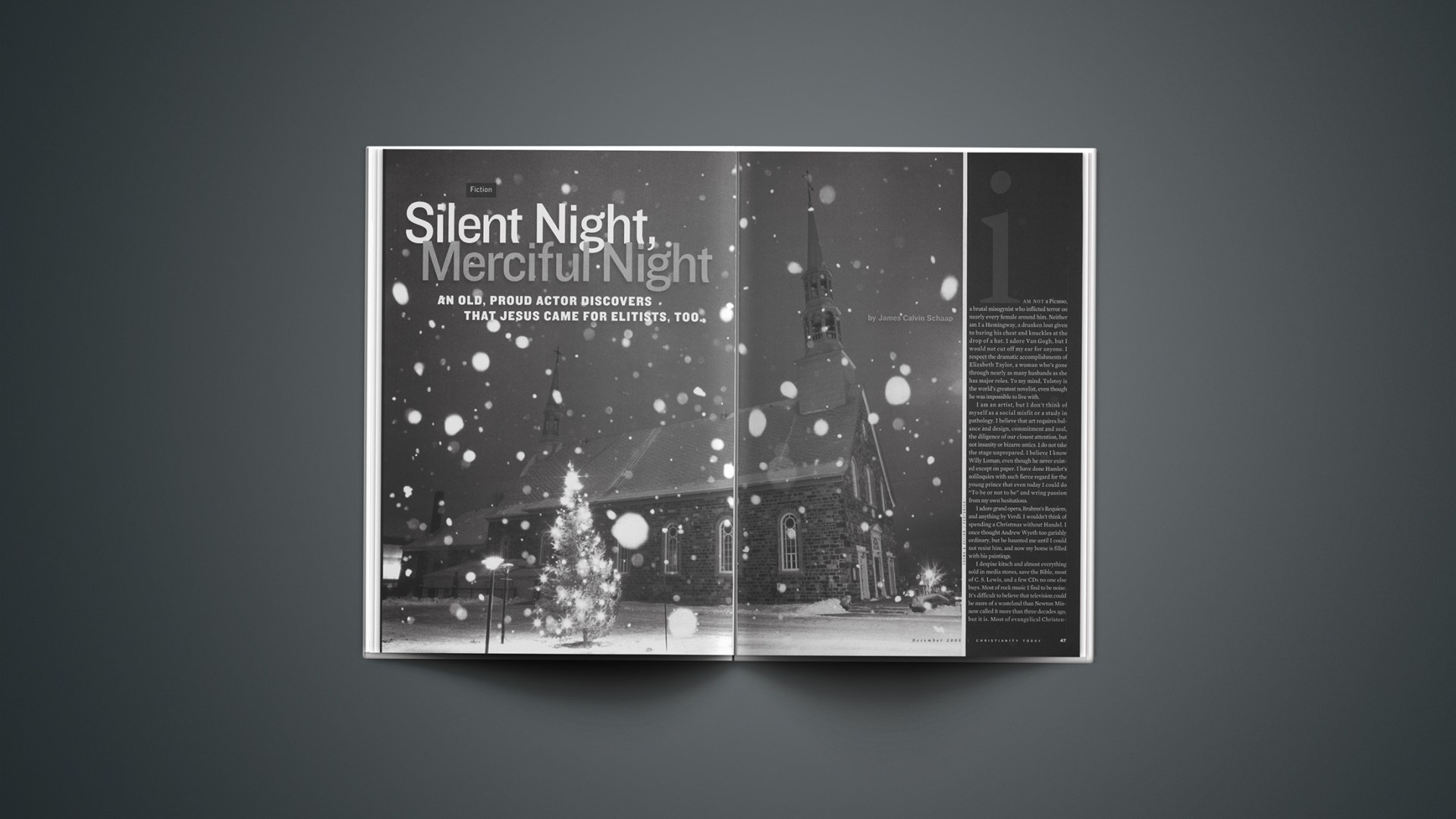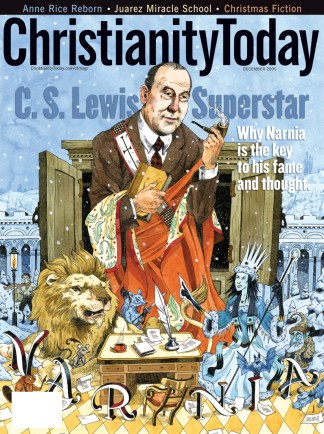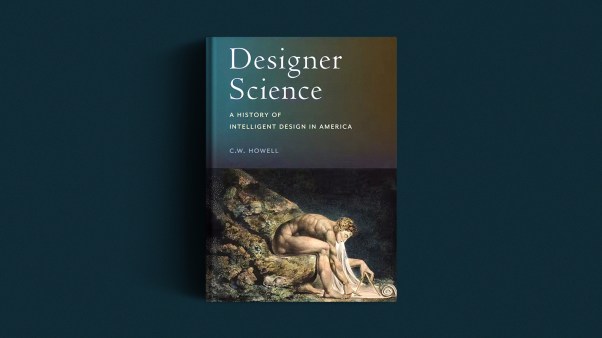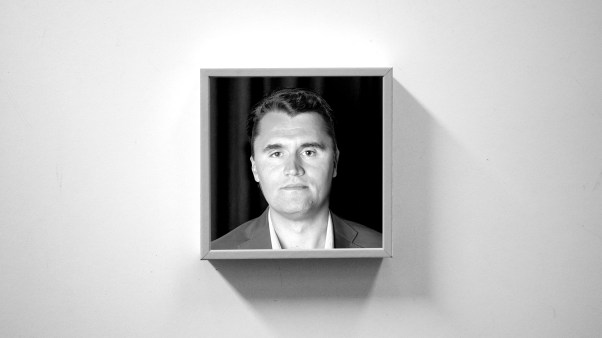I am not a Picasso, a brutal misogynist who inflicted terror on nearly every female around him. Neither am I a Hemingway, a drunken lout given to baring his chest and knuckles at the drop of a hat. I adore Van Gogh, but I would not cut off my ear for anyone. I respect the dramatic accomplishments of Elizabeth Taylor, a woman who’s gone through nearly as many husbands as she has major roles. To my mind, Tolstoy is the world’s greatest novelist, even though he was impossible to live with.
I am an artist, but I don’t think of myself as a social misfit or a study in pathology. I believe that art requires balance and design, commitment and zeal, the diligence of our closest attention, but not insanity or bizarre antics. I do not take the stage unprepared. I believe I know Willy Loman, even though he never existed except on paper. I have done Hamlet’s soliloquies with such fierce regard for the young prince that even today I could do “To be or not to be” and wring passion from my own hesitations.
I adore grand opera, Brahms’s Requiem, and anything by Verdi. I wouldn’t think of spending a Christmas without Handel. I once thought Andrew Wyeth too garishly ordinary, but he haunted me until I could not resist him, and now my home is filled with his paintings.
I despise kitsch and almost everything sold in media stores, save the Bible, most of C. S. Lewis, and a few CDs no one else buys. Most of rock music I find to be noise. It’s difficult to believe that television could be more of a wasteland than Newton Minnow called it more than three decades ago, but it is. Most of evangelical Christendom’s antics, from California Magic Kingdoms to the nearest suburb’s faddish megachurch, I find unseemly.
I’m sorry. I’m not nice. I don’t like smiley faces or annoying people who say, “Have a nice day.” Health concerns aside, I won’t eat fast food. In my 50 years, I have become conditioned to believe that whatever America thinks cool will soon be seen as silly.
I am, as you may have guessed, unabashedly elitist.
I chose the church I attend (at first) because of its architecture. Its unobtrusiveness in the surrounding hilly, wooded landscape seemed a tasteful reminder of the quiet importance of deep spirituality. I found the place a delight. The preaching is thoughtful; the earnestness, understated. Most of all, I appreciate the fact that the people I’ve come to know there really do like each other. I’ve met several of them, and they’re not showy or pretentious. When you enter Deer Valley Church, people don’t hang on you as if church were a discount shoe market. You’re not a mark at Deer Valley. I like that.
This year, they asked me to narrate their Christmas program. They gave me the script, and I read it. I found it slightly zealous but acceptable, even unassuming. It was a retelling of the old story, and it demanded a big voice, they said. I have been in theater for most my life. I teach theater at the university.
I appreciated the manner by which they asked. They told me they knew I was busy—and I am. They told me they felt the whole evening would be a triumph if they had someone with my presence to read the part. One of them said, “We can get by without you, but we’d love to have you. It would be an honor.”
I couldn’t say no.
I have never denied my need for God. I have, like many, forgotten him for considerable portions of my life, but he has not forgotten me. So I told the people from Deer Valley, the church I attend somewhat more than occasionally, that I would read the script for their Christmas program. I may have preferred T. S. Eliot, but the performance, I knew, would not be an embarrassment.
An Audience of Three
There is a kind of magic to theater that some will never know. Its attraction is not simply the applause. The lighting must be perfectly cued to pronounce every bodily gesture. The words, of course, must be masterful; content must be borne on sound that comes as close to music as anything unscored. One stands before an audience that is shrouded in darkness, awaiting the story, and when the drama is delivered, when it’s done with the passion required to communicate the text truly, the result is something very much alive.
That’s what I felt when we offered the Christmas presentation. Perhaps it was my own mystery, this man who visited the church often but sought little other than worship when there. Perhaps it was the script, which was, when I started to read, more effective than I’d thought it would be. Perhaps, simply, it was Christmas—no other season of the year is quite so conducive to joy and miracle. But we started almost blissfully in touch.
I stood on the proscenium and delivered my opening narration, the text before me, and the place was stone silent. The audience read every turn of my head, every flashing smile, every narrowed eye. When it’s all perfect, what happens in theater is love, an intimate and selfless act. It’s a dance, a wonderful dance, and in the opening minutes of this Christmas drama at Deer Valley Church—for whatever reason—what happened between me and the audience was quickened by love and devotion.
When I finished the opening, I walked to the back of the pulpit area and took a seat. Beside me, three adolescent girls from the choir were seated on the floor, while some younger children sang their hearts out in front. One of the girls had a string in her hand, a long, looping string that she gathered between her fingers in an intricate weave. The others watched and laughed, giggled and nudged each other, even though the children were singing.
I never married, so I never had children, and I don’t think I understand them. I am convinced, after teaching for 20 years, that our entire society has gone mad in the homage it pays to them. We have created a generation of kids whose education in self-esteem has spoiled them rotten. I have few students willing to commit to the craft of theater; the ones who do are often children of immigrants or the poor.
This disruption beside me—the girls obviously didn’t care if I heard them—stayed with me like a plague. I grew up in an age when it was an honor and a privilege to have the stage, but to be up front, part of the choir, meant nothing to these kids. They kept whispering and giggling, as if what we were doing that night wasn’t at all important.
I pushed my foot over to the closest of them, kicked her behind just slightly, then gave her an ogre-like look when she turned toward me. She did not stick out her tongue, but the face she gave me made it very clear that I was out of order in expecting she might listen to my admonition. Her lip went down in a sneer that said, “Who do you think you are?”
For the rest of the night, through all of my recitations, I never achieved the union I’d had with the audience in that first scene. The reason was simple. I knew there were three girls behind me who simply didn’t care. My intonation became strained, my pacing was gone—the shepherds, the glorious assembly of angels, the story of the stable, the young mother’s love, all of it came haltingly after my silent confrontation with the giggling girls. I knew they didn’t care, and, in my mind, that killed the performance.
I don’t know that I can completely explain my anger. Perhaps those who have never worked at art will not understand. Those three girls wrested my attention so completely away from what I was saying that, in the process, they became my sole audience. I delivered lines in a voice meant for them, even though they were behind me and probably never for a moment stopped chatting and playing with that loop of string. And the longer it went on—through the whole course of musical interludes, the recitation of the children, the five long narratives I offered—the more angry I became at their insolence. The more bitter I felt.
When it was over, I was relieved but seething. The lights came on following an a cappella rendition of “Silent Night.” My irritation grew over me like a disease I felt in every pore, and when I left the front of the church, I wanted only to get out.
A number of people—many of them—thanked me for what they considered a great performance. I nodded and smiled politely. And then an old woman came up, a woman I’ve come to know somewhat through my visits to Deer Valley, a retired missionary, a small and unassuming old lady with shaky hands and eyes bright as stars, a woman who must have read Luke 2 a hundred thousand times and spent her entire life telling it, over and over again, to children in the Far East. She took my hand, pulled me down toward her face, and gave me what the Scriptures call a holy kiss.
“Your reading,” she said. “It was wonderful.” I cannot describe the grace of her smile. “It was as if I had never heard that story before,” she said. “You made it new.” And then she nodded and was gone.
Christmas Epiphany
I have performed on stages throughout America. I have done countless seasons of summer stock, dozens and dozens of performances in repertory. I’ve done Shakespeare and Tennessee Williams, directed O’Neill and Moliere and August Wilson, but in all the theater I’ve ever done, I have never before considered myself a vehicle, a messenger, a conduit. I’d always thought of what I was doing as what I was doing.
That night, though, with the touch of a holy kiss on my cheek, I had a new sense that I’d been used as if I were an hourly employee of the business of the gospel. Even in my weakness, I’d been a strength, if only to one old woman who I would have assumed to be less in need of the gospel of love than most everyone in that small church on Deer Valley Road.
I drove myself home, alone, this odd experience still shimmering in the night’s white darkness. In my mind, I had failed. I hadn’t been the master I pride myself on being. I was only a servant. I wasn’t an artist; I was little more than material—imperfect at that, burdened with an ego bursting with petty grievance. I was used that night.
That’s when it hit me, this epiphany of Christmas. He came for those who need him, not because they are poor or slovenly or unable to care for themselves. He came for all those who need him, even some like me, the elitists, self-satisfied with the arrogance that insists they need nothing at all. He came for me because I, too—in my annoyance and pride—am very much among the needy.
A hundred times or more I’ve cried on stage. It is a technique that, with practice, one accomplishes quite easily. But alone in my car, the holy kiss still there on my cheek, I found myself suddenly in company with the Lord who came to earth, not for Christmas, not just for spoiled children, but for all of us, even me. He made me a blessing, even in my pride. He washed the sin of my human arrogance in his blood and through me made the story new, both to an old woman and a proud old actor.
At that moment I felt something totally unpracticed pinch my eyes and choke my breath. I wasn’t acting. The Lord of heaven and earth was acting upon me.
Come, Lord Jesus.
James Calvin Schaap is a professor of English at Dordt College and author of Startling Joy: Seven Magical Stories of Christmas (Revell, 2005), from which this short story is condensed.
Copyright © 2005 Christianity Today. Click for reprint information.
Related Elsewhere:
James Calvin Schaap’s Startling Joy: Seven Magical Stories of Christmas is available from Christianbook.com and other book retailers.
Other CT Christmas articles include:
The Real Twelve Days of Christmas | Celebrating Christ’s birth with saints of the faith during the actual Christmas season. (Dec. 23, 2004)
The Blessed Evangelical Mary | Why we shouldn’t ignore her any longer. (Dec. 5, 2003)
An After-Christmas Gift | A homeless man, an angel, and a reminder about our final home. (Dec. 23, 2003)
Violent Night, Holy Night | The Apocrypha tells us about the brutal and seductive world Jesus was born into. (Dec. 20, 2002)
Welcoming the Uninvited Savior | When the Holy Family fled Bethlehem, Herod’s evil became a blessing for Egypt. (Nov. 30, 2001)
Yabba-ka-doodles! | I’d begun to think of joy as a hard taskmistress, and of Christmas as her nasty elder sister. (Dec. 3, 2001)
Reclaiming Santa | One man’s mission to recover the spirit of St. Nicholas. (Dec. 15, 2000)
The Evolution of St. Nick | Tracing the roots of Santa Claus to the early church. (Dec. 15, 2000)
Christian History Corner: Festive Flora | Deck the halls with boughs of pagan signifigance, falalalala, lalalala. (Dec. 22, 2000)










